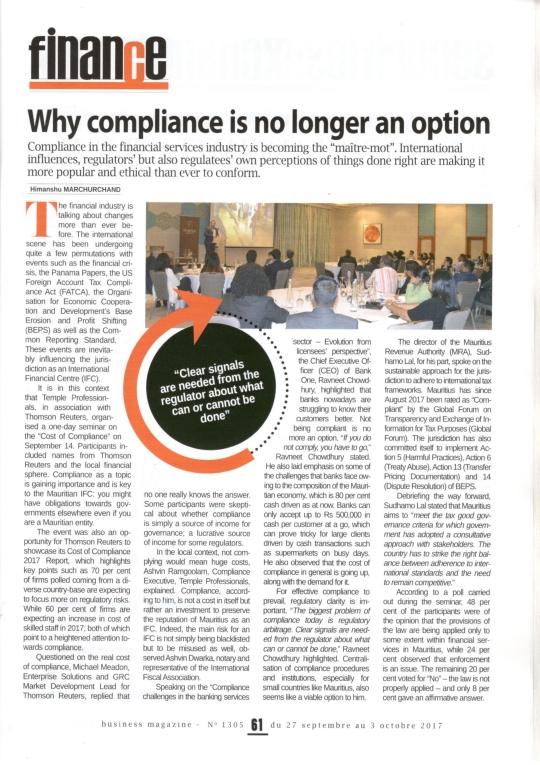As Mauritius prepares to compete as a regional FinTech hub, the obligations of transparency, accountability and traceability should be integrated as part of the Mauritian FinTech ecosystem, without any compromise on safeguarding the interests of end users and the jurisdiction
The financial services industry is undergoing a phase of undeniable evolution, even a revolution.
Not only have the traditional players, the banks, embraced a process of digital transformation, but now they have to contend with new entrants onto their previously well-guarded turf. FinTech is the word currently creating a buzz around the world, not least because of the potential for immediate application in the financial services industry.
FinTech encompasses a number of disruptive technologies powered by innovation. Be it blockchain technologies (also known as distributive ledger technologies), peer-to-peer platforms, crowdfunding, crowdsourcing, online payment solutions, FinTech promises to forever alter our way of doing business.
Amongst the more obvious benefits is the opportunity to create financial inclusion at an unparalleled scale. World Bank estimates place technology as a driver for reaching 700 million persons of previously unbanked persons worldwide between 2011 and 2014. Financial institutions now find themselves in a new-age El Dorado to capture clients in an economy that extends beyond more conventional brick and mortar institutions. Despite these exciting advancements, FinTech, is a double-edged sword and also multiplies the risks in terms of money laundering and the financing of terrorism. The emergence of FinTech has opened wide horizons and at the same time poses significant challenges in terms of regulating and fighting cyber laundering.
FinTech and developing a new compliance culture
There is no escaping it; FinTech can help facilitate the daily lives of people. This is not without a profound impact on the compliance function as we know it. In line with the financial services sector, the compliance role is called upon to evolve to meet these challenges without compromising on requirements of the existing regulation. With the emergence of Fin- Tech, compliance functions must demonstrate an ability to better manage risks, improve services and transparency, and thus build trust.
Compliance is now called upon to play a more important role with more significant financial investments being made for adequate resources. The mutation of the compliance function is also visible on the cultural and human level; companies are invited to introduce new business policies and codes of conduct. In addition, compliance professionals find considerable legitimacy with a broadening of their scope of activities.
Compliance needs to improve the reliability and industrialization of information processing in order to allow better analysis and effective management of the activity. Technologies can thus be used to produce reports that can evolve rapidly in the face of unstable and complex regulatory requirements. The types of information to be communicated, as well as the amount of data needed, call for new solutions and methods to analyze and process them. Beyond the element of risk mitigation, compliance processes face the challenge of mirroring a more fast-paced economy and increasing demands for accessibility. Technology provides the opportunity to cut through the paperwork and streamline the compliance function in an unprecedented manner.
FinTech and the Mauritian Landscape
The rise of new financial technologies, such as payment by mobile or virtual currencies, is of concern not only to the world, but also to Mauritius, which is aspiring to become a hub for financial services and a well-respected International Financial Centre.
Mobile phone payments globally are arguably one the most immediate manifestations of the changes in our financial habits. Cash transfers by mobile phone, which have gained momentum, most notably on the African continent, present important risks in money laundering. This trend calls for better involvement of mobile network operators to address the problem. This was flagged as early as 2010 by the Financial Action Task Force (“FATF”) in a report on new payment methods, illustrating that mobile payment service providers may be non-traditional financial institutions with widely varying controls and supervision measures. With an estimated mobile penetration of 140% as of June 2016*, Mauritius is clearly no exception.
The adoption of the “Code on the prevention of money laundering and financing terrorism” by the Financial Services Commission (the “FSC”) brings us in line with international standards with regard to existing products in the financial services industry. Loopholes persist, however due to the fact that new products and services, for instance virtual currencies like Bitcoin, amongst others, bring with them their complex and transnational nature, which exist outside the existing regulatory framework. This must be amended to meet the recommendations as set out by the FATF, under its ‘Guidance for a Risk-Based Approach on Virtual Currencies’.
Crowdfunding and crowdsourcing also currently fall into a regulatory ‘grey area’. While these business models have not taken up a strong foothold in the local jurisdiction yet, it is only a matter of time, especially when considering the potential for strong alternative access to finance they present for SMEs. Thriving models already exist in the UK, the US, and Asia.
It is also worth mentioning that digital currencies, having previously served as a bridge between the legal and the underground economy, tend to be treated with suspicion. This is a key opportunity for compliance concerns to be factored into the product development and innovation process. Once parameters are set, which ensure transparency, accountability, and traceability, the potential they represent is transformative.
Previous communiqués from the Bank of Mauritius on virtual currencies, as well as the introduction of a regulatory “Sandbox” under the Board of Investment, are clear indicators that new technologies are on the radar of the local authorities. Mauritius nevertheless remains in an international rat-race to establish itself as a hub for financial services. Providing suitable regulatory frameworks for FinTech is critical if we are to keep up with other financial centres such as Singapore and Dubai, where the development of blockchain technology and peer-to-peer platforms are at the heart of a myriad of new businesses.
A challenge for the regulator
Regulatory concerns are legitimate. Total deregulation would not serve the economy, FinTech or the end customer. On the other hand, FinTech has the potential to be a driver in the Mauritian economy through the creation of skilled jobs or innovation in services. It is a real balancing act to protect the investor, the customer and the economy, while supporting the development of the state-of-the-art technologies in the financial services industry. On the other hand, maintaining a conservative outlook for too long could handicap prospective FinTech companies which intend to set up in Mauritius.
The exploration of RegTech, which couples both regulatory and technology aspects presents a plausible route forward. RegTech is a new and revolutionary answer to FinTech and it adopts the risk-based approach. It focuses on technologies that facilitate compliance with laws and regulations as well as internal and statutory standards more effectively.
In conclusion, it is essential that the obligations of transparency, accountability and traceability be integrated as part of the Mauritian FinTech ecosystem, without any compromise on safeguarding the interests of end users and the jurisdiction.
General Electric’s Jack Welch famously said that we should change before we have to. And compliance is no different.
*Article jointly written by Vandana Boolell, CAMS and published in the Global Finance Mauritius Magazine of April 2017

 *During the Compliance Conference 2018 (Cost of Compliance) organised by Temple Professionals Ltd, the training limb of Temple Group (Mauritius), I was approached by Himanshu Marchurchand, journalist at Business Magazine, to give an overview on the importance of compliance.
*During the Compliance Conference 2018 (Cost of Compliance) organised by Temple Professionals Ltd, the training limb of Temple Group (Mauritius), I was approached by Himanshu Marchurchand, journalist at Business Magazine, to give an overview on the importance of compliance.



